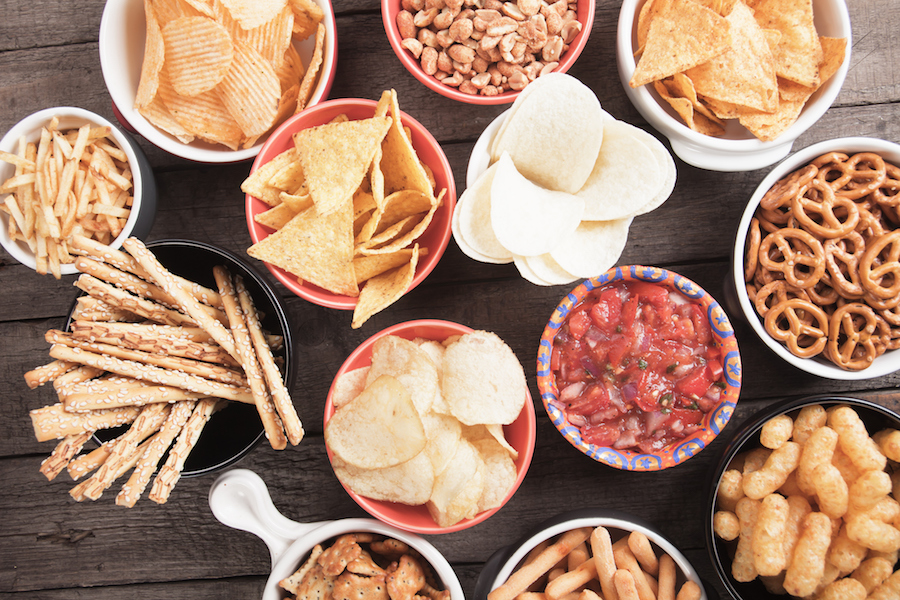Can’t say no to salty crisps? Scientists just got a step closer to explaining salt-cravings
Too much salt is a major health risk – but why are salty snacks so irresistible?
If you’ve ever uttered the words, “I could eat crisps forever!”, or happily say no to chocolate and cake, but are utterly powerless if someone pops a bowl of salty nachos in front of you, then it’s probably safe to say you’re familiar with the notion of salt cravings.
But just why is it that salty snacks can be so darn addictive? Well, scientists from the Beth Israel Deaconess Medical Center in Boston might now be able to explain it a little further, after looking at how certain brain signals are triggered when we crave the white stuff.
Brain signals
The research team looked at a specific sub-group of neurons, located in the ‘nucleus of the solitary tract’ (NST – a cluster of nerves near the base of the brain) that drives our appetite for salt.
Neurons are basically cells within the nervous system that play a central role in transmitting messages to and from the brain, and while the neurons in question were discovered a decade ago, by co-corresponding author Prof Joel Geerling, exactly what was going on with them in terms of triggering salt cravings was still a bit of a mystery.
Dr Jon Resch, a co-author of the research published in Neuron, and colleagues in the Division of Endocrinology, Diabetes and Metabolism at the teaching hospital of Harvard Medical School, says more research is needed – but their findings shed light on the brain circuits involved in salt cravings, and could help towards the development of drugs to regulate salt urges in people with certain hormone deficiencies associated with over-consumption of sodium.
“We identified a specific circuit in the brain that detects sodium deficiency and drives an appetite specific for sodium to correct the deficiency,” said Dr Resch. “In addition, this work establishes that sodium ingestion is tightly regulated by the brain, and dysfunction in these neurons could lead to over or under-consumption of sodium – which could lead to stress on the cardiovascular system over time.”

UK adults consume a third more salt than advised
Major health threat
These neurons aren’t the only factor in salt cravings. Certain medical conditions, deficiencies and hormonal imbalances can sometimes play a part. Plus, we do of course need salt to survive and lacking in sodium (salt) can be extremely detrimental.
However, over-consumption of salt is generally a far bigger problem and a key risk factor in many major diseases, such as high blood pressure, stroke and heart disease – which is why unravelling the mystery of salt cravings is such an important topic.
According to CASH (Consensus Action on Salt & Health), while UK guidelines recommend adults consume no more than 6g of salt a day, on average, UK adults are consuming 8.1g a day – a third more than they’re meant to. The trouble is, many foods already contain all the salt we need, so by the time you start adding salt to cooking or sprinkling it on food – not to mention the high levels of ‘hidden’ salt in many processed foods, like sauces and ready-meals – it’s little wonder we’re consuming far too much.
Reducing salt intake to less than 5 grams per day (about 1 teaspoon) will save around 2.5 million lives every year https://t.co/zNxBxTTXSR pic.twitter.com/WW3r2dhslk
— WHO (@WHO) August 9, 2017
5 simple ways to reduce your salt intake
Concerned about your salt intake? Small, daily steps can add up to a big difference to your overall health…
1. Stop salting the water when you cook. Those potatoes and vegetables will cook just as well without it.
2. Don’t fancy bland food? Flavour meals with spices instead – many spices will add extra health benefits too, and there are tons of options to explore.
Cut back on using salt with these 19 natural alternatives: https://t.co/nKSGAF73mB pic.twitter.com/fRPLkQ3wiv
— BHF (@TheBHF) September 27, 2017
3. Cook sauces from scratch. Ready-made jars of things like pasta and curry sauces are often loaded with extra salt, and making your own might be a lot easier than you think. Same goes for soups!
4. Go easy on the cheese and butter. Life’s too short to deprive yourself, but certain cheeses can be high in salt, so check the labels and enjoy them as occasional treats.
5. Use your loaf – when it comes to choosing bread, as it can contain high levels of salt. The same’s true for packets of biscuits and breakfast cereals, so scan the labels before buying.
Do you have a sweet or savoury tooth?
The Press Association
Latest posts by The Press Association (see all)
- The Princess of Wales pays tribute to the late Queen in burgundy ensemble for Qatar state visit - December 3, 2024
- Give your garden wildlife some home-made Christmas treats - December 2, 2024
- What is surgery prehabilitation and why is it important? As Joe Wicks launches get ‘fit for surgery’ videos for elderly - November 30, 2024
- How to manage your arthritis in the cold weather - November 30, 2024
- How to help a child through grief - November 28, 2024





















